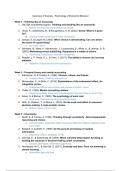Overview of theories - Psychology of Economic Behavior
Week 1 - Thinking like an economist
1. Van Dijk (unpublished paper): Thinking and deciding like an economist.
a. History, micro-economics (indifference curves)
2. Hoyer, K., Zeelenberg, M., & Breugelmans, S. M. (2022). Greed: What is it good
for?
a. Greed and self-interest (social value orientation)
3. Iyengar, S, & Lepper, M. (2000). When choice is demotivating: Can one desire
too much of a good thing?
a. too much choice
4. Schwartz, B., Ward, A., Monterosso, J., Lyubomirsky, S., White, K., & Lehman, D. R.
(2002). Maximizing versus satisficing: Happiness is a matter of choice.
a. maximizing & satisficing , Ultimatum Bargaining
5. Redden, J. P., Haws, K. L., & Chen, J. (2017). The ability to choose can increase
satiation.
a. Repetitive choices and satiation/satisfaction
Week 2 - Prospect theory and mental accounting
1. Kahneman, D, & Tversky, A. (1984). Choices, values, and frames.
a. Prospect theory / framing , risk aversion
2. Morewedge, C., & Giblin, C. (2015). Explanations of the endowment effect; An
integrative review.
a. Endowment effect, loss aversion and process accounts / focus
3. Thaler, R. (1999). Mental accounting matters.
a. Mental accounting, integration and segregation (prospect theory), silver lining
4. Arkes, H, & Blumer, C. (1985). The psychology of sunk cost.
a. Sunk costs (mental accounting) (prospect theory)
5. Roth, S., Robbert, T., & Straus, L. (2015). On the sunk-cost effect in economic
decision-making: A meta-analytic review.
a. Different types of sunk costs
Week 3 - Uncertainty
1. Shafir, E, & Tversky, A. (1992). Thinking through uncertainty - Nonconsequential
reasoning and choice.
a. certainty effect, disjunction effect, prisoners dilemma, Wason’s selection task,
sunk costs
2. Bastardi, A, & Shafir, E. (1998). On the pursuit and misuse of useless
information.
a. disjunction effect / ambiguity, WTB,
3. Van Dijk, E., & Zeelenberg, M. (2006). When curiosity killed regret: Avoiding or
seeking the unknown in decision-making under uncertainty.
a. curiosity and regret, information gap theory
4. Noordewier, M. K., & Van Dijk, E. (2017). Curiosity and time: From not knowing to
almost knowing.
a. Information gap and time
, 5. Mechera-Ostrovsky, T., Liew, S. X., & Newell, B. R. (2023). The role of risk, regret,
and rejoice in non-instrumental information seeking.
a. non-instrumental information seeking, risk seekers / risk avoidance
Week 4 - Emotions
1. Van Dijk, E, & Zeelenberg, M. (2005). On the psychology of 'if only': Regret and
the comparison between factual and counterfactual outcomes.
a. Regret, counterfactual thinking, comparison orientation
2. Huang, W., & Zeelenberg, M. (2012). Investor regret: The role of expectation in
comparing what is to what might have been.
a. Regret and disappointment (investor regret), maximizers / satisficers
3. Tykocinski, O, & Pittman, T. (1998). The consequences of doing nothing: Inaction
inertia as avoidance of anticipated counterfactual regret.
a. Inaction Inertia, regret
4. Krijnen, J. M. T., Zeelenberg, M., Breugelmans, S. M., & Van Putten, M. (2020).
Inaction inertia in retirement saving.
a. Inaction Inertia, regret, time
5. Gilbert, D., Morewedge, C., Risen, J., et al. (2004). Looking forward to looking
backward - The misprediction of regret.
a. Prediction of regret
Week 5 - Time
1. Loewenstein, G., & Thaler, R. H. (1989). Anomalies - Intertemporal choice.
a. Intertemporal choice (time), discount rates & time, amount, valence (+/-),
framing / prospect theory
2. Hilbert, L. P., Noordewier, M. K., & Van Dijk, W. W. (2022, Early Access). Financial
scarcity increases discounting of gains and losses: Experimental evidence
from a household task.
a. Financial scarcity, discount rates
3. Krijnen, J. M. T., Zeelenberg, M., & Breugelmans, S. M. (2015). Decision
importance as a cue for deferral.
a. deferring (postponing) decisions & importance
4. Kahneman, D, & Thaler, R. (2006). Anomalies - Utility maximization and
experienced utility.
a. Retrospective utility (peak & end rule / duration neglect)
Week 6 - Self-interest and fairness
1. Van Dijk (2015). The economics of prosocial behavior.
a. prosocial behavior, reciprocity,
b. sanctions (Fehr & Gachter)
c. Social utility and ultimatum bargaining
d. Dictator game and ultimatum game (Van Dijk & Vermunt)
e. Delta Game ( Handgraaf et al.)
f. Different types of social value & Delta game (Van Dijk, de Cremer &
Handgraaf)
2. Shalvi, S., Dana, J., Handgraaf, M. J. J., & de Dreu, C. K. W. (2011). Justified
ethicality: observing desired counterfactuals modifies ethical perceptions and
behavior.





